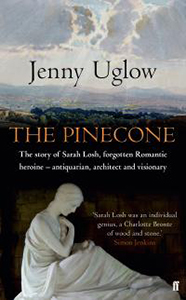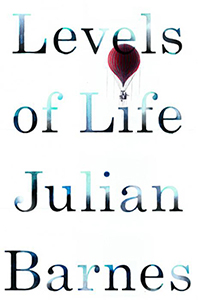 JULIAN BARNES. Levels of Life is about ballooning and photography’s first era, and grief. Barnes traces the attachment between stage star Sarah Bernhardt and soldier Frederick Burnaby. Burnaby dies at Khartoum from a spear-thrust to the neck from one of the Mahdi’s soldiers. In the Parisian background pioneering photographer Nadar is a ubiquitous presence.
JULIAN BARNES. Levels of Life is about ballooning and photography’s first era, and grief. Barnes traces the attachment between stage star Sarah Bernhardt and soldier Frederick Burnaby. Burnaby dies at Khartoum from a spear-thrust to the neck from one of the Mahdi’s soldiers. In the Parisian background pioneering photographer Nadar is a ubiquitous presence.
This is prequel to Barnes on loss. Levels of Life is less a memoir than a report from a foreign country, home to millions and a zone of which little is known and even less said. In the case of his wife of thirty years the passage from diagnosis to death took just thirty-seven days. Barnes’ account is unflinching truth.
TIM BUTCHER. The travel genre is sellable and publishers happily throw everything and anything into the pot. Airport lounges or Lost in Translation hotel interiors are just as likely to be commissioned.
Butcher’s Blood River is different and unrepeatable. Everyone Butcher meets advises him against it. To travel the Congo overland is not just hazardous but impossible. Butcher captures the continent-sized country whose few points of urban concentration and economic activity are linked by air and the odd steamer. He travels a land where road, rail, money, any evidence of government beyond venal soldiery have all evaporated. The Congo’s ruination has been slow and inexorable.
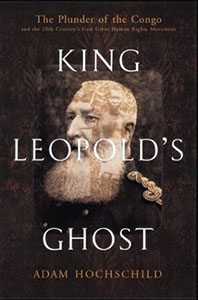 ADAM HOCHSCHILD is included in Butcher’s short bibliography. King Leopold’s Ghost is a readable and appalling narration of the unique colonial possession set up by Belgium’s nineteenth century king. The totalitarian state, Hochschild shows, was not a Hitlerian-Stalinist invention.
ADAM HOCHSCHILD is included in Butcher’s short bibliography. King Leopold’s Ghost is a readable and appalling narration of the unique colonial possession set up by Belgium’s nineteenth century king. The totalitarian state, Hochschild shows, was not a Hitlerian-Stalinist invention.
HARLAN COBEN. Books to Die , nudged me towards Harlan Coben…
No Second Chance (2003), The Innocent (2005)and Hold Tight (2008) share the same virtues; the confident deployment of a range of characters from both sides of the law, an initial situation that is baffling and desperate, the reader led over four hundred pages to an outcome that has a cast-iron logic.
Coben’s art is the one that conceals its art and is fiendishly difficult to make.
NICCI FRENCH. The literary editors of the broadsheets have passed on reviewing Nicci French’s books. It is true that the two partner-authors write an unostentatious prose but then so does many a Man Booker winner. In the sixteen years since the first book they have never fallen back on formula or repetition.
Formally they are adventurous. Until It’s Over (2007) has a unique and abrupt switch of narrator at the half-way point and it works triumphantly. Losing You (2006) is composed within an Aristotelian discipline of twenty-four hour time and place.
French and Gerrard are particularly sharp on women and parenthood. Waiting For Wednesday, out this year, is the third novel in a sequence that marked a change of course in 2011. It has that most satisfying of structures, two narratives ostensibly discrete but which inexorably fuse.
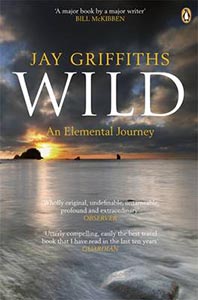 JAY GRIFFITHS. Jay Griffiths came my way courtesy of Literature Wales and a mailing from Ty Newydd. Wild (2007) is well-named, a roller-coaster of a prose adventure from experimenting with ayahuasca in Peru to the Arctic, Indonesia, the Australian desert and highlands of West Papua.
JAY GRIFFITHS. Jay Griffiths came my way courtesy of Literature Wales and a mailing from Ty Newydd. Wild (2007) is well-named, a roller-coaster of a prose adventure from experimenting with ayahuasca in Peru to the Arctic, Indonesia, the Australian desert and highlands of West Papua.
The metaphors and comparisons are extravagant. It’s a literary Oakwood – I’m not sure I’d repeat it that often but it makes for a giddying, exhilarating experience.
MICHAEL LEWIS. The twenty-four hour news cycle is a darting, energetic up-to-the-minute phenomenon. But it does not do continuity or detail. Those are up to writers and scholars to provide.
Michael Lewis has been to those Southern nations who have foresworn the traditional economic tool of devaluation in favour of locked-in allegiance to the ECB. He spends the longest time in Greece. Greece has had thirty-one general strikes since 2010. They barely make the news now, unless heads are hit and cars torched.
No-one would call Michael Lewis a bleeding heart. Greece has no national land registry. Lewis reports that contracts of sale, hand-written, are documents of fiction. He meets the tax inspector who risks demotion, dismissal even, should he pursue tax collection with any zeal.
Jobs that are defined as ‘arduous’ permit retirement at age fifty-five for men, fifty for women. More than six hundred Greek professions have somehow managed to get themselves classified as arduous. They include hairdressers, radio announcers, waiters, musicians; the list is endless.
A sour, pointed, essential guide to a Europe which is probably irremediably divided.
JENNY UGLOW. Jenny Uglow’s series of acclaimed biographies moved north a few years ago. Her 2013 The Pinecone is located due west across the Pennines from the Cherryburn, the Tyneside home of Thomas Bewick, her last biographical subject.
Sarah Losh, heroine of The Pinecone, came from the lowland area of Cumbria that is unfeted in comparison with the Lakes. Uglow’s prose is soaked with love. This is her subject’s childhood territory:
‘Sarah grew up in a land of waters, springs and becks and rivers; the Petterill with its woods and birds and otters; the Caldew that rushed from its source high on the mountain of Skiddaw; the Eden, sometimes wide and smooth, shining in the broad, green valley, then suddenly narrowing, forging its way through gorges, with swift turns and rapids. At the estate of Nunnery, in her grandfather’s time, the owners made new walks beside the Eden to suit the passion for the picturesque, and the rocks by the river were inscribed and carved. A little further downstream the Howards at Corby Castle also created dramatic paths and river terraces. But it was another river and another spring that made the Loshes’ fortune and gave Sarah the money to build- the great, grand Tyne and the small and salty Birtley Spring.’
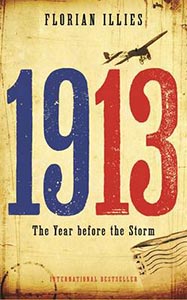 FLORIAN ILLIES. Illies, by day a partner in a Berlin auction house, has borrowed the form that Eduardo Galeano used in his Memory of Fire trilogy. 1913. The Year Before the Storm is a treatment of 1913 month-by-month, comprising creative documentary pieces from a paragraph in length to several pages.
FLORIAN ILLIES. Illies, by day a partner in a Berlin auction house, has borrowed the form that Eduardo Galeano used in his Memory of Fire trilogy. 1913. The Year Before the Storm is a treatment of 1913 month-by-month, comprising creative documentary pieces from a paragraph in length to several pages.
Its montage-type effect creates the depth, illustrative detail and colour that Charles Emmerson did not get in his more conventional and extensively reviewed 1913 The World Before the Great War.
Illies’ perspective is written from a Vienna-Paris axis. In the land of chemists Ecstasy is synthesised in 1913, a patent application made, and it is forgotten about. Some of the figures, like Georg Trakl, have a lesser familiarity in a British setting but many of Illies’ subjects are titans.
His Klimt paints with half a dozen naked models around him and is himself naked beneath his apron. Freud is here sending Mahler an invoice for a chat during a walk taken together in a park. Proust perfects his gaze by spending two hours before a single Notre Dame portal. Franz Marc allegorises the Balkan Wars in The Wolves. August Macke follows his own contrasting path with Sunlit Path painted on the edge of Switzerland’s Lake Thun. Kafka writes a twenty page letter to Felice dubbed ‘the Worst Marriage Proposal in the World’.
More grimly, a Russian exile is in Vienna in 1913, writing and occasionally relaxing with an evening stroll in Schoenbrunn park. The same park is used by an impoverished painter living in a men’s hostel. The next time the solitary Russian travels abroad it is to the 1943 Tehran Summit. He is now the Generalissimo and his equals are Roosevelt and Churchill.
1913 is a treat.


